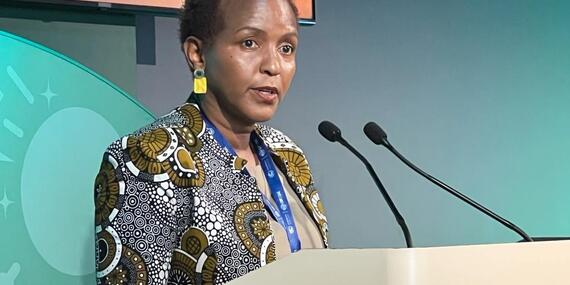ASG Msuya @COP28: More needed to build resilient communities

Assistant Secretary-General and Deputy Emergency Relief Coordinator, Joyce Msuya's remarks at a side event at COP28 on Strengthening Delivery: Aligning development, humanitarian and climate finance
I am honoured to be here today to open this important meeting on aligning development, humanitarian and climate finance. I want to thank the International Fund for Agricultural Development (IFAD) and the World Bank Group for partnering with the Office for the Coordination of Humanitarian Affairs (OCHA) on this event.
And a warm welcome and thank you to our distinguished participants from across the UN, UN Member States, international financial institutions and the private sector, and to everyone else attending today.
Excellencies, Colleagues, Ladies and Gentlemen,
As we have said on countless occasions, the climate crisis is without doubt a humanitarian crisis.
In the last 20 years, we have seen a staggering 800 per cent increase in climate-related needs in humanitarian appeals.
Climate change is hitting the most vulnerable people, first, worst and longest – people, communities and countries already weakened by violence, insecurity, political instability, economic inequality and poverty.
Climate change also further exacerbates the risks of conflict, adds to social and material loss and damage, and undermines development gains for people and communities who have contributed the least to the climate crisis.
The humanitarian community is leading the response. Every year, between a quarter and a third of funds from the Central Emergency Response Fund (CERF) goes to climate-related disasters. We are working hard to adapt our approaches to the emerging status quo, by committing more of our limited resources to helping people ahead of predictable disasters through anticipatory action.
And we are incorporating more and more community resilience-building into disaster responses, for example through the distribution of drought resistant seeds and promoting sustainable agricultural and water management practices.
But I want to be clear about one thing: there is no humanitarian solution to the climate crisis.
What the people and communities in the firing line of climate change desperately need are longer-term, transformational investments in mitigation, adaptation and sustainable development.
We need to work better to layer and sequence development, climate, and humanitarian funding, as well as private sector finance, so that communities get holistic support to adapt to climate shocks, avert and minimize the impacts, and work towards and preserve development gains.
To do this, we need to figure out how to work more coherently across development, humanitarian and climate finance systems.
Last year at COP 27, in the outcome decision on funding arrangements for loss and damage, Member States acknowledged that while there were many institutions and stakeholders involved in funding activities, existing arrangements fell short when it came to responding to current and future climate impacts.
Identifying ways to ensure coordination and complementarity of climate funds with the broader mosaic of development and humanitarian finance remains absolutely critical.
With humanitarian financing diminishing, we have been forced to take incredibly difficult decisions about the people and places we will target with humanitarian assistance and protection. This means that there are many people we will not be able to reach, yet who remain extremely vulnerable to the climate crisis. We are therefore calling – with the greatest urgency – for climate finance to be channeled to those who need it most.
Today’s meeting is an important opportunity to discuss how all of us – across the political, humanitarian, development, private sector and beyond – can align our efforts to make this happen.
OCHA and the humanitarian community stand ready to play our part – to make better use of our pooled funding instruments alongside wider investments in development and adaption; to share data and analysis on affected communities; and – perhaps most importantly – to leverage the partnerships we have built with local people and organizations to ensure their needs and perspectives are the guiding force behind our efforts.
The people we serve in crisis settings have a right to a life of hope and dignity, and yet that right is threatened today by a crisis they did so little to cause. It is up to us to do better, together. Let us get to work.
